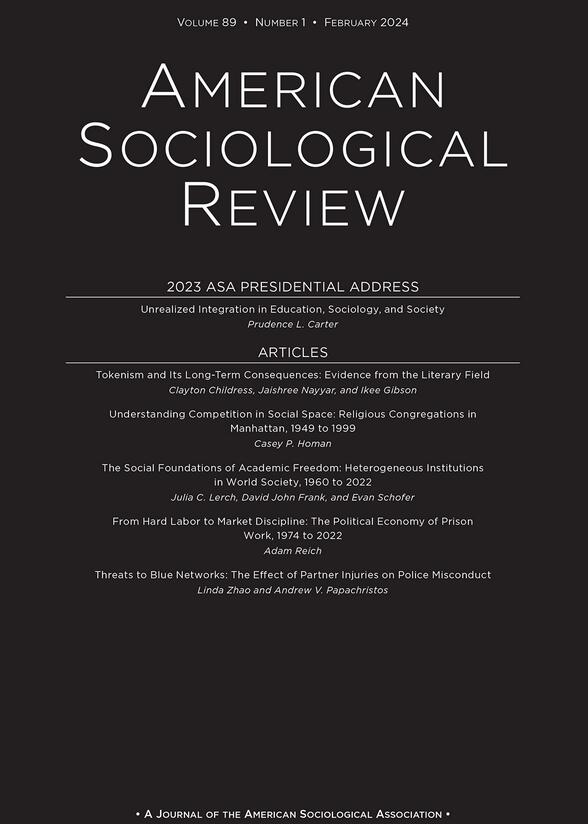巩固家庭教育和保健
IF 6.2
1区 社会学
Q1 SOCIOLOGY
引用次数: 7
摘要
对于一个特定的人来说,许多社会经济资源是相关的,但资源也会在家庭中积累,这取决于人们如何根据个人特征来选择关系。这项研究提出,在长期关系中,人们将多种资源匹配作为一种策略,以创建具有系统优势组合的家庭——我们称之为“整合”策略。通过分析健康与退休研究的数据,并将吸烟作为衡量健康的标准,我们发现,夫妻在结婚之初的教育和健康状况都很匹配,而且这种匹配的系统模式随着时间的推移而增强。我们发现,吸烟的匹配不仅仅是教育同性婚姻的副产品,而且吸烟/不吸烟的匹配随着时间的推移而增加。此外,越来越多的夫妇将教育和健康结合起来进行排序,因此,受过高等教育的夫妇不吸烟的可能性甚至比只考虑教育或吸烟状况的夫妇更大。在结婚和第一次生育之间,在戒烟方面日益增加的教育不平等加剧了这一巩固过程。使用当前人口调查,我们发现这些模式在婚姻中比在同居中更强。夫妻之间教育和健康的结合是一个重要的机制,它扩大了家庭中的不平等,并可能在几代人之间扩大不平等。本文章由计算机程序翻译,如有差异,请以英文原文为准。
The Consolidation of Education and Health in Families
For a given person, many socioeconomic resources are correlated, but resources also accumulate in families, depending on how people sort in relationships based on their individual characteristics. This study proposes that people match on multiple resources in long-term relationships as a strategy for creating families with systematically advantaged portfolios—a strategy we call “consolidation.” Analyzing Health and Retirement Study data and using smoking as a measure of health, we show that couples match on both educational and health statuses at the start of marriage, and this systematic pattern of matching intensifies over time. We find that matching on smoking is not simply a byproduct of educational homogamy, and that matching on smoking/non-smoking status has increased over time. Moreover, couples increasingly sort on education and health jointly, such that highly educated couples are even more likely to be nonsmoking than would be expected by matching on education or smoking status alone. Increasing educational inequalities in quitting smoking between marriage and first birth reinforce this consolidation process. Using Current Population Surveys, we find these patterns are stronger in marriages than in cohabitations. The consolidation of education and health in couples is an important mechanism that amplifies inequality in families and, potentially, across generations.
求助全文
通过发布文献求助,成功后即可免费获取论文全文。
去求助
来源期刊

American Sociological Review
SOCIOLOGY-
CiteScore
13.30
自引率
3.30%
发文量
35
期刊介绍:
The American Sociological Association (ASA) is a non-profit membership association established in 1905. Its mission is to advance sociology as a scientific discipline and profession that serves the public good. ASA is comprised of approximately 12,000 members including faculty members, researchers, practitioners, and students in the field of sociology. Roughly 20% of the members work in government, business, or non-profit organizations.
One of ASA's primary endeavors is the publication and dissemination of important sociological research. To this end, they founded the American Sociological Review (ASR) in 1936. ASR is the flagship journal of the association and publishes original works that are of general interest and contribute to the advancement of sociology. The journal seeks to publish new theoretical developments, research results that enhance our understanding of fundamental social processes, and significant methodological innovations. ASR welcomes submissions from all areas of sociology, placing an emphasis on exceptional quality.
Aside from ASR, ASA also publishes 14 professional journals and magazines. Additionally, they organize an annual meeting that attracts over 6,000 participants. ASA's membership consists of scholars, professionals, and students dedicated to the study and application of sociology in various domains of society.
 求助内容:
求助内容: 应助结果提醒方式:
应助结果提醒方式:


